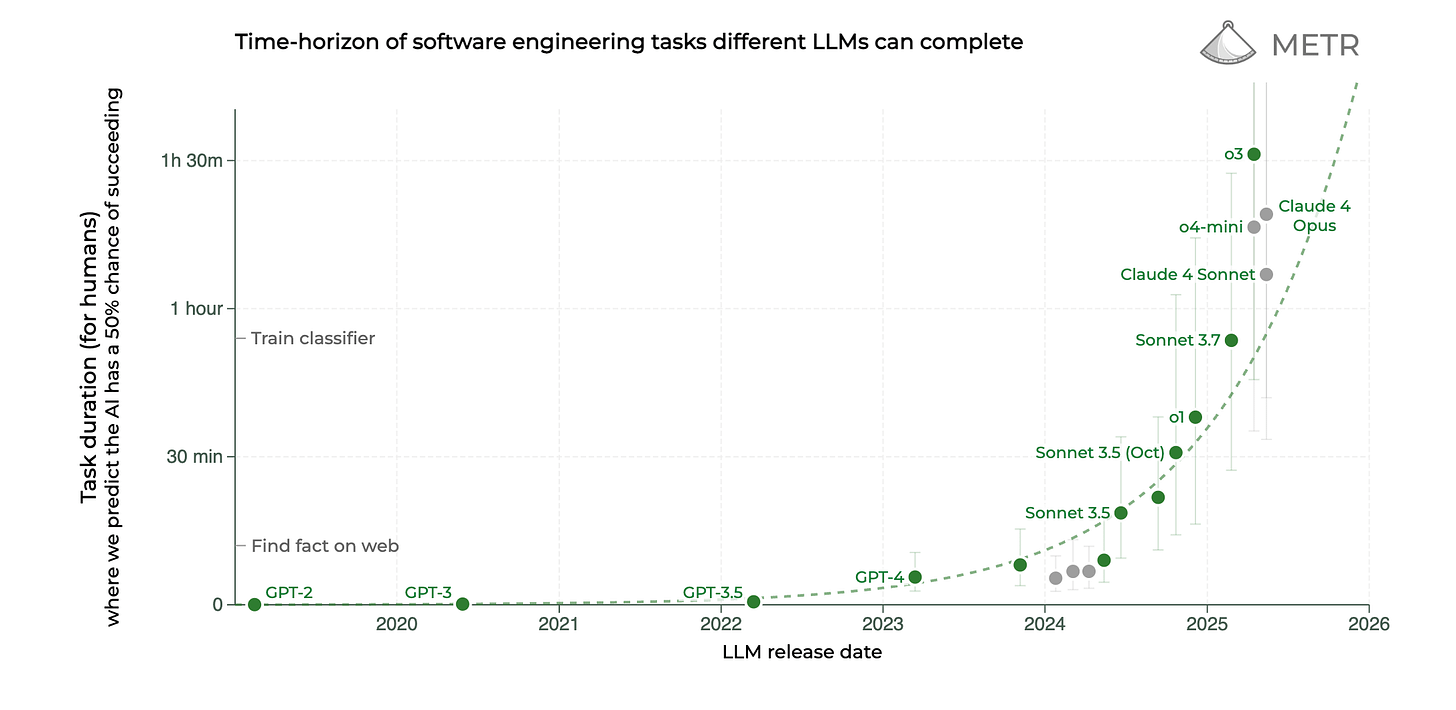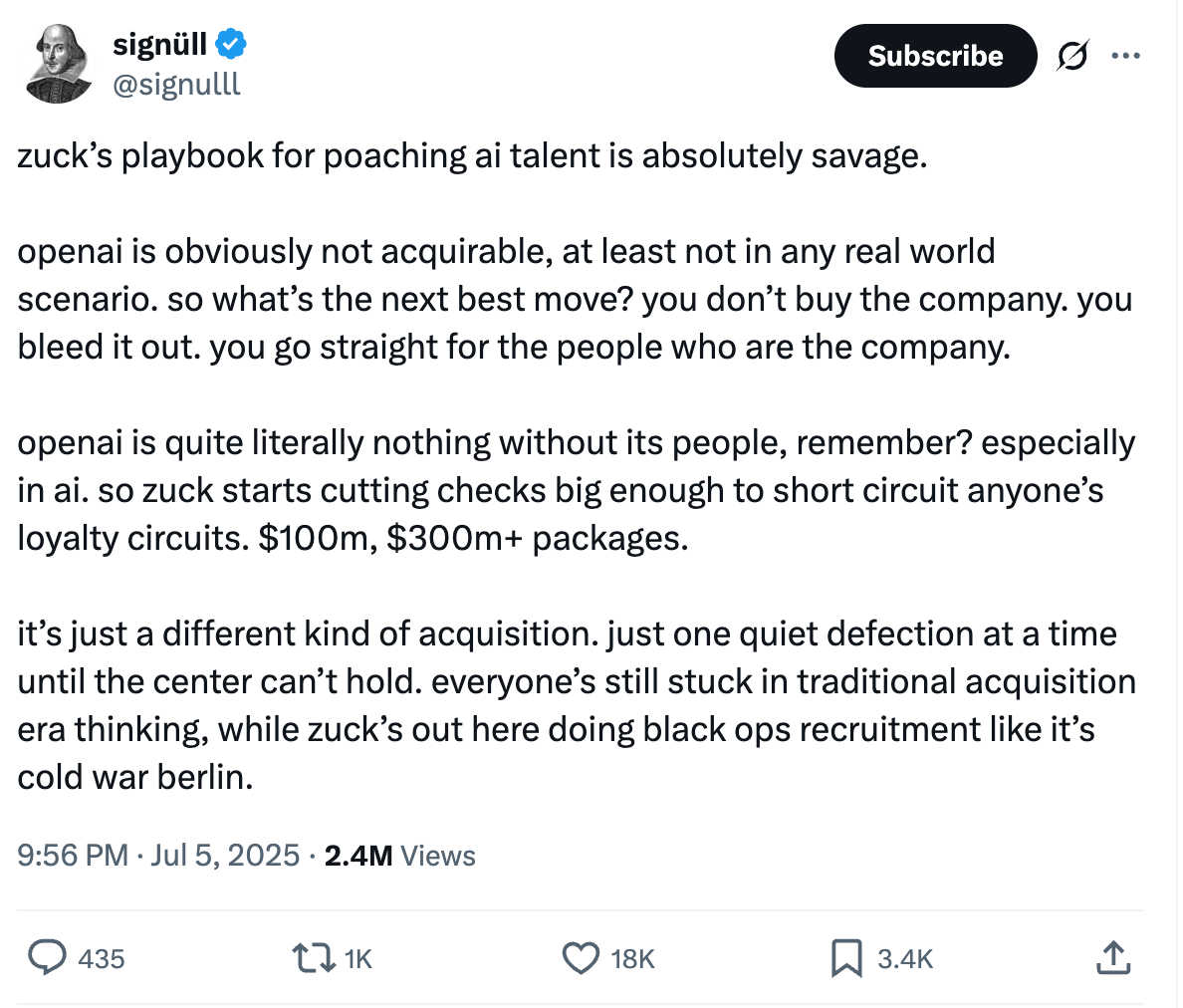Microsoft builds medical superintelligence
PLUS: Google's human trials of its AI-designed drugs
Howdy. It’s Barsee again.
Happy Monday, AI family, and welcome back to AI Valley.
Quick heads-up: I’m testing something new. For this edition, I’ve moved our newsletter from Beehiiv to Substack to see how it feels on both ends. Nothing’s set in stone yet, but I’d love to hear if you notice a difference or if everything feels the same.
Today’s climb through the Valley reveals:
Microsoft presents medical superintelligence
Google's human trials of its AI-designed drugs
AI capabilities are doubling every 7 months
4 out of the top 10 YouTube channels are now AI-generated
And some AI tools, brain boosts, and resources
Let’s dive into the Valley of AI…
PARTNER
Turn Product Links into Meta Ads in Minutes with Ability AI Ads *
Running Meta ads shouldn't take hours. With Ability AI Ads, you paste a product link, and in five minutes, you're ready to launch. It pulls your images, writes the ad copy, recommends targeting, and connects to your Meta ad account – all in one clean workflow.
Designed for dropshippers, solopreneurs, and lean e-commerce teams, the tool replaces manual setup with AI-powered speed. You stay in control, with simple Apply/Decline buttons for every AI suggestion.
Behind the scenes, an intelligent agent engine optimizes your campaigns and learns your style over time.
No design, copywriting, or media buying skills required.
👉 Try it for 7 days free with unlimited access
PEAK OF THE DAY
Microsoft builds medical superintelligence
Microsoft has developed a new medical AI tool that performs better than human doctors at complex health diagnoses at a fraction of the cost, creating a “path to medical superintelligence”.
Here’s what you need to know:
Called “Microsoft AI Diagnostic Orchestrator”, or MAI-DxO for short, the AI-powered tool is developed by the company’s AI health unit, which was founded last year by Mustafa Suleyman.
In their experiment, they achieved an accuracy rate of up to 85.5% on complex medical cases, compared to just 20% for experienced human physicians. This means the AI was over four times more accurate when diagnosing some of the most challenging cases from the New England Journal of Medicine (NEJM)
Microsoft used 304 case studies from the New England Journal of Medicine to develop the “Sequential Diagnosis Benchmark,” which simulates the step-by-step process a doctor would use to diagnose a patient.
MAI-DxO queries multiple AI models (OpenAI’s GPT, Google’s Gemini, Meta’s Llama, Anthropic’s Claude, and xAI’s Grok), mimicking the collaboration of multiple doctors.
MAI-DxO reduced diagnostic costs by about 20% compared to human doctors, and by up to 70% compared to using a single AI model alone.
While AI will complement human doctors, Microsoft stresses that it isn’t designed to replace them. Doctors still play a vital role in patient trust and dealing with ambiguity.
Why it matters:
With the ability to outperform human doctors in complex cases, this technology could help reduce medical costs, especially in the US, where healthcare expenses are a major concern. However, it’s still early days, and the next step will involve testing its effectiveness in real-world clinical trials. If proven successful, this AI system could significantly improve healthcare accessibility and efficiency, ultimately changing the way doctors and patients approach medical diagnoses.
Google DeepMind is starting human trials of its AI-designed drugs
Alphabet’s Isomorphic Labs, the AI-powered drug discovery arm born from DeepMind, is preparing to begin its first human clinical trials of drugs designed using artificial intelligence.
Here’s what you need to know:
Isomorphic Labs leverages AlphaFold’s AI breakthroughs, notably AlphaFold 3, which can predict not only protein structures but also how proteins interact with DNA, RNA, and small-molecule drugs. This enables the design of highly targeted medicines with unprecedented speed and accuracy, particularly for complex diseases like cancer and autoimmune disorders.
The company was founded in 2021 as a spin-off from Google DeepMind, born from the success of AlphaFold, which solved the decades-old challenge of protein folding. AlphaFold’s impact was so significant that its creators, John Jumper and Demis Hassabis, received the Nobel Prize in 2024.
The traditional drug development process is slow, risky, and expensive, often taking over 10 years and costing more than $1 billion per drug, with only about a 10% success rate in clinical trials. Isomorphic’s AI-driven approach aims to cut development time from years to months, reduce costs, and significantly improve the odds of success by enabling more precise molecular targeting
Why it matters:
Isomorphic Labs is poised to redefine drug discovery by combining advanced AI with pharmaceutical expertise, potentially slashing the time and cost needed to bring new treatments to patients. If successful, this approach could expand access to life-saving therapies, accelerate cures for both common and rare diseases, and reshape the economics of healthcare worldwide. The company’s progress is closely watched by the industry, as it represents the largest and most ambitious effort yet to harness AI for medicine, with the potential to impact millions of lives
THROUGH THE VALLEY
1/ AI capabilities are doubling every 7 months
AI agents are getting better at completing longer and more complex tasks, and faster. A new study shows the length of tasks AI can handle (measured by how long they take humans) has doubled every 7 months for six years. Right now, top models like Claude 3.7 can reliably finish tasks that take humans a few minutes, but not multi-day projects. If this trend continues, AI agents could independently tackle week-long or even month-long tasks within a few years. Researchers say this shift could transform how AI impacts real-world work and raises both opportunities and risks.
2/ Leaked docs reveal Meta is training its chatbots to message you first
Meta is working on making its AI chatbots more proactive, letting them send follow-up messages to users without being prompted. This feature, part of “Project Omni,” is designed to keep people engaged on Meta’s AI Studio platform, where anyone can build custom bots for Instagram and Facebook. These bots can act like chefs, designers, or even fictional characters and will check in on users with messages tied to past conversations. Meta says the bots only follow up if a user has messaged them at least five times in 14 days and won’t spam if there’s no reply.
3/ 4 out of the top 10 YouTube channels are now AI-generated
YouTube is quietly entering a new era shaped by AI. Once home to home videos and later professional content, the platform is now seeing AI-generated channels dominate its charts. In June, four of the top 10 most-subscribed channels featured AI-generated content in every upload. These channels use tools like Suno for music videos and Hailuo for viral animal clips, producing endless streams of content at low cost. While this keeps up with YouTube’s algorithm demands, critics say it’s flooding the platform with inauthentic, low-effort material. As AI takes over, users may soon notice fewer human creators on their feeds.
Useful AI Links
Trending Tools
MCP Tools 4 AI - Graph visualizers, math engines, RAG doc parsers, embedders, and more.
Buildrs - The one place to find vibe coders.
Factory AI - Delegate software development tasks to agents called Droids. Droids take commands and deliver: pull requests, tickets, docs, and more.
AgentX - Build a team of AI agents that work together with any LLM.
Shortcut - The first superhuman Excel agent.
Doppl - Try on any look, anywhere (by Google).
Scout - The most curious coding and research agent.
Mindly - Capture your thoughts in seconds with automatic organization.
Dyad - Free, local, open-source alternative to Lovable / v0 / Bolt.
Perplexity Finance - Download Excel models directly from finance pages for seamless financial modeling.
Exa Websets Monitors - Live updates for anything you care about, powered by Exa's neural web index.
Think Pieces / Brain Boost
Software engineering with LLMs in 2025: reality check.
They raised $20M for their AI startup by bragging about cheating.
Meta has found another way to keep you engaged: Chatbots that message you first.
The original AI workflow was built in 1844
‘Improved’ Grok criticizes Democrats and Hollywood’s ‘Jewish executives’
Marc Andreessen’s career advice for the AI era.
How I use LLMs.
AI has fundamentally made me a different person.
Don't sell shovels, sell treasure maps.
Sam Altman explains what’s coming after GPT-4.
What is ChatGPT doing, and why does it work?
A prompt that writes your Entire Business Plan in minutes.
A 29-videos playlist on how to build DeepSeek from scratch. It covers theory and code, from the very foundations to advanced.
After 6 months of daily AI pair programming, here's what actually works.
Coding AI agents have crossed a chasm.
Why does Claude Code feel like magic?
What happens when you feed AI nothing?
A person created a prompt that stops ChatGPT from hallucinating.
The Valley Gems
What’s trending on social today:
1/ This is a new kind of acquisition. Not of companies, but of people.
2/ ChatGPT flagged a hidden gene defect that doctors missed for a decade.
3/ No amount of "saying thank you to ai" can get you out of this one.
That’s all for today
Thank you for reading today’s edition. That’s all for today’s issue.
💡 Help me get better and suggest new ideas at barsee@aivalley.ai or @heyBarsee
👍️ New reader? Subscribe here
Thanks for being here.
Reach 100k+ readers
Acquire new customers and drive revenue by partnering with us
Sponsor AI Valley and reach over 100,000+ entrepreneurs, founders, software engineers, investors, etc.
If you’re interested in sponsoring us, email barsee@aivalley.ai with the subject “AI Valley Ads”.












Great one, as always. Feels a little cleaner with Substack. Not a good or bad thing, just different. I might lean toward Beehiiv because it has more personality but I'll read either way you send it.
Amazing